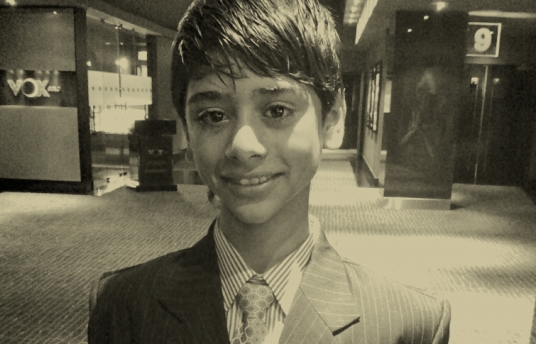People in Film: Mahmoud Asfa and Ossama Bawardi
Oct 16, 2012

After premiering at the Toronto International Film Festival, director Annemarie Jacir enjoyed the Middle East premiere of her new feature ‘When I Saw You’ at the Abu Dhabi Film Festival yesterday. The film, also Palestine’s Oscar submission for 2012, was screened in the presence of her star child actor Mahmoud Asfa, who watched the film for the first time.
We caught up with him and producer Ossama Bawardi.
Mahmoud Asfa
DFI: How did you end up in the casting of the film?
Mahmoud: A group of people came to our school asking to see some students for a film. The teachers chose five children from my class. We did a casting in front of the camera and I knew that they did the same things with all the schools in the north of Jordan. The videos were then screened to Annemarie and I stayed a whole month praying that she’d choose me. One day her team called and they visited my house; this is when they told me I should act in her film. I can’t describe how happy I was. Then we spent more than two months rehearsing.
DFI: This is your first acting experience. How would you describe it?
Mahmoud: Yes it’s the first time. I loved it but it was very tiring.
DFI: What’s your favourite moment in the film?
Mahmoud: I enjoyed the scene where we all dance the Dabke (a traditional folk dance).
DFI: What did you feel when you watched yourself on the big screen for the first time?
Mahmoud: I didn’t know what to feel, it’s overwhelming. I loved the film and loved how the room was full and [the audience was] asking questions about the film.
Ossama Bawardi
DFI: How did you end up casting Mahmoud for the main role?
Ossama: We saw more than 200 children. After seeing Mahmoud for the first time, Annemarie dreamt of him the same night. And from the moment she laid her eyes on him, she knew that he’s the right person for the role.
DFI: How did the audience in Toronto react to the film?
Ossama: It was amazing. We were surprised on how engaged the people were with the film. And the foreign audience understood it, it spoke to them regardless of their nationality, language and background.
DFI: Did you find that the film created some curiosity towards the history of Palestinian refugees back in 1967, which is when the film’s story is set?
Ossama: The film talks about the reality and shows an important historical period which was not treated in other films. The importance of the film is that it recalled this important part of history and put forward the Palestinian cause.
DFI: What were the challenges you faced while making the film?
Ossama: Funding is the biggest challenge for Palestinian films or Arab films in general. But we were lucky to find the right support. But what’s more difficult is distribution; we don’t have a serious platform of distribution in the region for independent Arab films. But I am very hopeful; today we screened at a full house, and that film appeals to different generations of audiences.